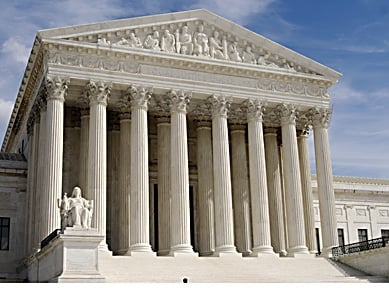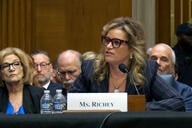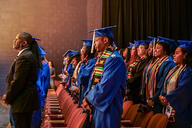You have /5 articles left.
Sign up for a free account or log in.

U.S. Supreme Court
WASHINGTON -- Hundreds of organizations filed briefs with the U.S. Supreme Court last week, arguing various positions in a series of lawsuits over whether states can bar same-sex marriages. Briefs came from employers, politicians, civic associations, religious groups and different groups of law professors. Also filing briefs last week were two national groups of historians, the American Psychological Association and the American Sociological Association.
Groups of law professors (based on their specialties) regularly urge the Supreme Court to take one stance or another. The same is true of professors in a number of fields, and there are likely individual professors backing states that seek to bar same-sex marriage. But it is unusual for so many disciplinary associations -- all citing a research consensus within their field -- to file briefs in the same case. And while the American Anthropological Association didn't join this round, it filed in an earlier case.
The briefs filed by scholarly associations all come down on the side of marriage equity, but cite different approaches to research, reflecting their different methodologies.
The Organization of American Historians submitted a brief based on research prepared by George Chauncey, the Samuel Knight Professor of History and American Studies at Yale University and one of the leading historians of gay and lesbian Americans. The brief focuses on the systematic discrimination against gay people for much of American history -- an important point legally, because various Supreme Court cases have held to a higher level of scrutiny distinctions in laws among groups if one of those groups has been subject to discrimination.
The brief notes the long history of state laws against gay sex and of employment policies (of governments and private organizations) that discriminated against gay people.
And while the brief notes considerable legal progress in recent years, it also argues that anti-gay bias persists and links this bias to the efforts against gay marriage.
"Some of the same groups that previously fought gay teachers in schools, gay characters on television shows, domestic partnership policies and antidiscrimination laws have provided leadership to the campaigns to prevent gay couples from marrying," the brief says. "Their messaging strategy has mobilized some of the same fears and antigay hostility that helped defeat prior gay-rights measures."
The American Historical Association also filed a brief.
The American Psychological Association brief focuses on psychology research showing that being gay is "a normal expression of human sexuality," and that the institution of marriage "offers social, psychological and health benefits" that are denied to gay people in states barring same-sex marriage.
Further, the brief discusses numerous research studies of gay and lesbian couples, concluding that "there is no scientific basis for concluding that same-sex couples are any less fit or capable parents than heterosexual couples, or that their children are any less psychologically healthy and well adjusted."
The American Sociological Association makes similar arguments in its brief, saying that existing evidence shows that children of gay couples are as well adjusted as other children. 'The clear and consistent social science consensus is that children raised by same-sex parents fare just as well as children of different-sex parents," the brief says.
"This consensus holds true across a wide range of child outcome indicators and is supported by numerous reliable studies, including those using nationally representative data. The research supports the conclusion that the extension of marriage rights to same-sex couples has the potential to improve child well-being insofar as the institution of marriage may provide social and legal support to families and enhance family stability, which are key drivers of positive child outcomes."




